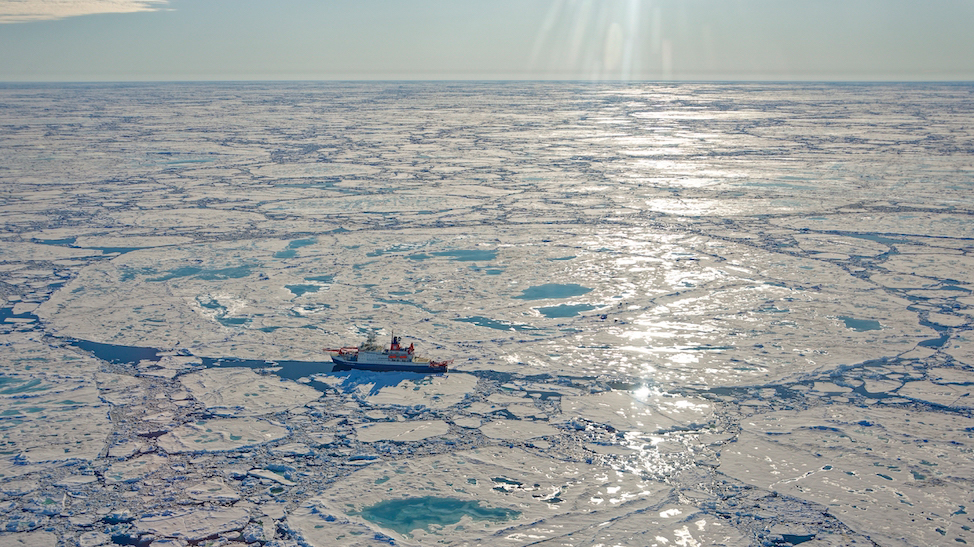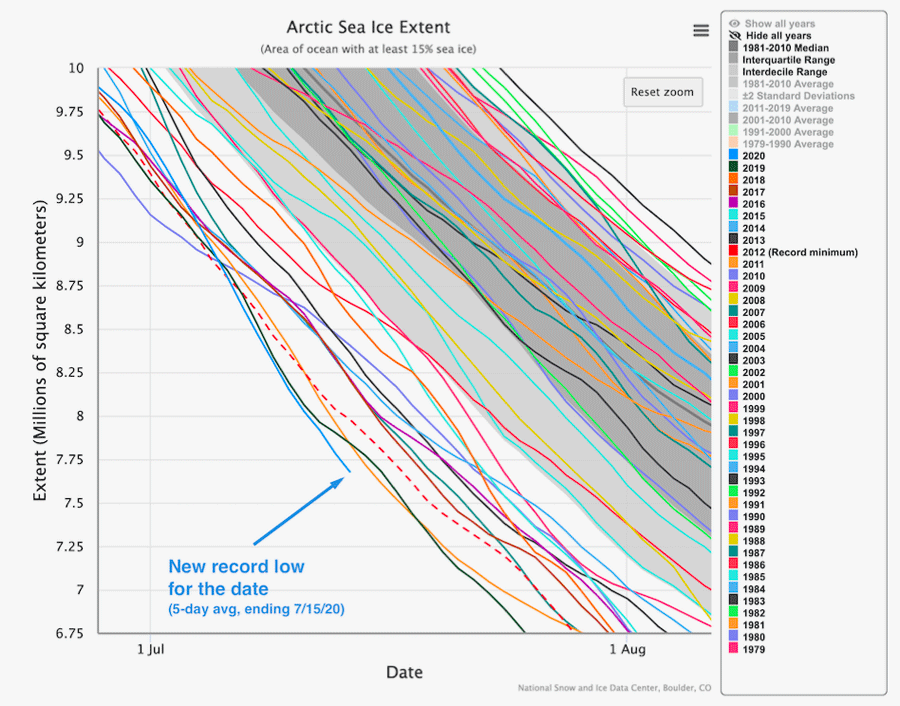HIGHEST PRIORITY - PLEASE SHARE
SEE YALE STUDY BELOW

"Temperatures in the Siberian Arctic reached record averages in June, with some areas seeing rises of as much as 10C (18F), according to EU data.
The Arctic is believed to be warming twice as fast as the global average."
WHAT HAPPENS WHEN THE TEMPERATURE RISES 5 DEGREES C?
This is clearly not good news as the loss of the Arctic Sea ice by 2030 or earlier is expected to raise the global average temperature by another 5-6 degrees* Celsius; potentially putting us up to 7-8 degrees C over the 1750 baseline. These numbers are becoming comparable to the Permian Extinction that occurred nearly 250 million years ago.
THE PERMIAN EXTINCTION
*Siberian Arctic reports temperatures 10 degrees higher than last year; curvilinear increase pattern already.
"greenhouse gases in the model until ocean surface temperatures in the tropics had risen by 10 degrees Celsius (20 degrees Fahrenheit), the conditions driven by the global warming that was occurring at the time."
WHO SURVIVES?
-- 
Moreover, as the ice melts; methane is released unabated - making the Arctic the driver of global climate change and not just a passenger on the train into the abyss.
"As the various Arctic climate feedbacks show, we are fast approaching the stage when climate change will be playing the tune for us while we stand by and watch helplessly, with our reductions in CO2 emissions*having no effect in the face of, say, runaway emissions of methane.' Read More
* this, of course, makes clean, alternative and renewable energy sources completely redundant
Loss of the Arctic ice would also cause the Greenland ice sheet to melt and Scientists estimate this would raise sea levels by 20 feet.* This would be a disaster for coastal cities such as NewYork, New Orleans, Miami, and Los Angeles among many others. It would also bring about an unprecedented economic collapse and with it various social and political malignancies.
Naturally agricultural and fishery products will be profoundly impacted leading to serious short and long-term food shortages. Expect natural resource wars as a consequence - possibly nuclear - as everyone including governments become more desperate.
*Should the Antarctic Continental Icecap also melt it is estimated that sea levels would rise 200 feet; however, that would likely be the least of our problems.
Furthermore, many nuclear power stations are located near the ocean shores and would be in considerable peril. There are over 450 nuclear plants in the world and those near these ocean shorelines should be promptly risk assessed by governments as to the consequences of rising sea levels and shut down and decommissioned if the exposure to an imminent disaster is too great. This naturally puts another nail in the coffin for any future expansion of this industry under exponential and abrupt climate change conditions or other circumstances.
OR OTHER CIRCUMSTANCES
At the same time, recent scientific research indicates and confirms that we are already in the midst of the sixth mass extinction and ecological collapse with 100's more vertebrates at-risk. Given the evidence related to the further Arctic melting and the corresponding release of methane, we will face runaway climate change that, as noted above, falls outside of any possible human control by way of CO2 - hence, these at-risk species would also be doomed. This thereby causes a domino effect that will cause other even more adaptive species to go extinct-ultimately leading to the extinction of all large mammalian vertebrates, in short order, given the rapidity of the exponential climate changes and ecological collapse.
Vertebrates on the brink as indicators of biological annihilation and the sixth mass extinction
"The ongoing sixth mass species extinction is the result of the destruction of component populations leading to eventual extirpation of entire species. Populations and species extinctions have severe implications for society through the degradation of ecosystem services. Here we assess the extinction crisis from a different perspective. We examine 29,400 species of terrestrial vertebrates and determine which are on the brink of extinction because they have fewer than 1,000 individuals. There are 515 species on the brink (1.7% of the evaluated vertebrates). Around 94% of the populations of 77 mammal and bird species on the brink have been lost in the last century. Assuming all species on the brink have similar trends, more than 237,000 populations of those species have vanished since 1900. We conclude the human-caused sixth mass extinction is likely accelerating for several reasons. First, many of the species that have been driven to the brink will likely become extinct soon. Second, the distribution of those species highly coincides with hundreds of other endangered species, surviving in regions with high human impacts, suggesting ongoing regional biodiversity collapses. Third, close ecological interactions of species on the brink tend to move other species toward annihilation when they disappear—extinction breeds extinctions. Finally, human pressures on the biosphere are growing rapidly, and a recent example is the current coronavirus disease 2019 (Covid-19) pandemic, linked to wildlife trade. Our results reemphasize the extreme urgency of taking much-expanded worldwide actions to save wild species and humanity’s crucial life-support systems from this existential threat. "
June 10, 2020
The melting of the Arctic ice field is the greatest emergency and challenge that humanity has ever faced in its short history; previous world wars, space exploration, and a missile crisis - pale profoundly in comparison. The urgency is unprecedented because if we fail to deal with this very soon - then we lose any chance of mitigating exponential climate impacts and that could then turn the current sixth mass extinction into another truly Permian event quickly destroying over 95% of life on this planet. No vertebrate species will have dispensation from such consequences.
For decades we have known that at some point we would have to face the challenge and urgency of this situation - yet we did nothing?. Call it cognitive dissonance, human nature, procrastination, politics, or just plain stupid- it doesn't matter what term or explanation is used; there are now no other options - the grim reaper is already at our door and the urgency has never been greater...
YALE STUDY
By Bob Henson | Monday, July 20, 2020
Baked by midsummer sun,
Arctic sea ice could face
worst losses on record
A period of tranquil weather paves the
way for potential trouble later this summer.

T.A.McNeil, BAdmin, CMA, CA
CEO&FOUNDER
FIRST FINANCIAL INSIGHTS INC